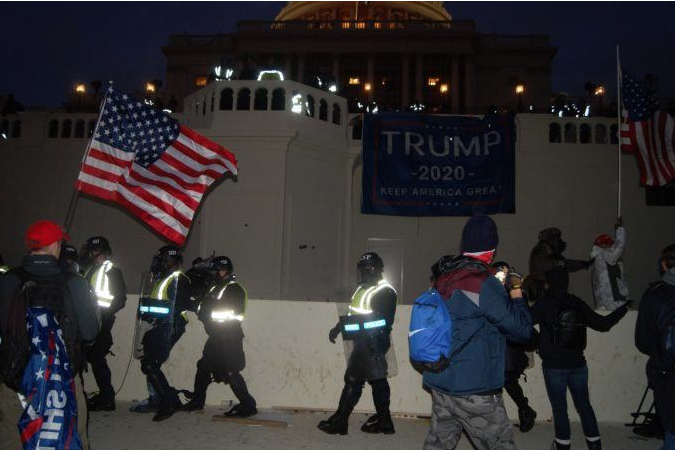CommentsDEMOCRACY WATCH - As we approach the first anniversary of the attack on the United States congress, it is imperative to understand that the threat to democracy is not over.
As details about the full scope of the scheme to undermine the presidential election of 2019 emerge, it becomes even more important to understand that the coup did not end that day.
Most commentary informed by concern about the threat to US democracy focuses on countering voter suppression and strengthening voter rights across the country. For example, in a recent article the New York Times editorial board argued that the Democratic Party should end the filibuster in order to pass voting rights legislation, and admonished Republican leaders to respect the republic by combatting the extremists in their midst. These arguments are a response to the recent behavior of the Republican Party: following Trump’s insistence that the vote was stolen, the party has spent the last year advancing voter suppression laws and gerrymandering voting districts to ensure Trump’s return to power.
Despite the continuing threat of a conservative overthrow of constitutional democracy in the US, most liberal political commentators continue to cling to democratic majoritarianism. This belief is based on the idea that whomever wins the elections is legitimate and has a political mandate. Yet we do not think that democratic majoritarianism is an effective antidote under the current circumstances. Electing a candidate who has campaigned for violating and perhaps overthrowing the constitutional government of the US is unacceptable—even if they win an election.
Democratic party leaders have shown no inclination to override the filibuster over the last year, and Republicans show few signs of disavowing Trump’s anti-democratic arguments and his sway over the party more broadly. Moreover, even without Republican efforts to suppress voting, elections in the US are structurally weighted to privilege predominantly white, conservative, and rural portions of the country by institutions such as the Supreme Court, the Senate, and the Electoral College.
Rather than replacing these institutions with a more genuinely representative democracy, the country is being pushed ever-deeper into rule by a minority of the electorate. As a result, Trump may very well win the election of 2024 – even without a replay of the January 6 coup.
He must not be allowed to hold power again. We believe that this basic declaration is the only appropriate response to the deepening of authoritarianism in the US. While we certainly are in favor of ensuring access to the ballot box, and of fighting for longer-term reform measures to build genuine representative democracy in the US, preventing Trump from wielding political power again is the single most important way to cope with the growing threat of tyranny.
The danger of a dictatorship following the 2024 election is real because of another problematic structural characteristic of the US political system, which combines a constitutional state based on rule of law and division of powers with a centralized government dominated by the presidency. There is a clear contradiction between these two aspects of the system: the constitutional limits on central power and the domination of the governmental structure by the presidency. Whomever holds the presidency, especially if they do not feel bound by constitutional restraints, has tremendous power to sabotage the political system – as Trump demonstrated during his four years in power.
How can Trump be prevented from winning power again? First of all, he should be prosecuted for his crimes, up to and including treason (i.e. insurrection). This would render him ineligible to stand for re-election. Such a step may sound like a no-brainer: after all, Trump brazenly stood on a platform on January 6, indicting the election results and encouraging his followers to storm congress. Yet as legal scholars Laurence Tribe, Donald Ayer, and Dennis Aftergut noted, almost a year after the insurrection there is little evidence that the Justice Department under Attorney General Merrick Garland is engaged in an investigation of the coup leaders – let alone Trump himself. As they put it, this raises “the alarming possibility that the Biden Justice Department may never bring charges against those ultimately responsible for the attack.” Movements inside and outside Congress should mobilize to ensure that Trump is prosecuted for treason.
In addition, anti-authoritarian political forces must find ways to demonstrate to the voting public before the 2024 election that Trump’s reelection will set off a crisis of ungovernability because of massive opposition to his inauguration. This could take the form of a “pledge of resistance” or other similar measures.
Last of all, political organizations and popular movements should begin planning for acts of resistance to prevent Trump’s assumption of power, in case he does win re-election or otherwise attempts to take office. Given what we know about the dismantling of constitutional democracy, we cannot sit idly by while he gains power through an illegitimate election.
But what if Trump is displaced by a member of his party who is equally willing to embrace his anti-democratic inclinations, perhaps with a slightly slicker veneer? This is a very real possibility given the trends that we have described within the party. However, we believe that the main imperative at this juncture is to oppose the Republican Party’s transformation into a personality cult that could destroy the basic institutions of US constitutional democracy.
The history of authoritarian movements underlines the importance of individual “leaders” as points of coalescence for reactionary ideas. Trump has provided ample evidence that he understands and is willing to exploit this dynamic. Preventing the demagogic and dictatorial former president from returning to power is of paramount importance.
(Omar Dahbour and Ashley Dawson are professors at the City University of New York. This article was featured in Counter Punch.)






